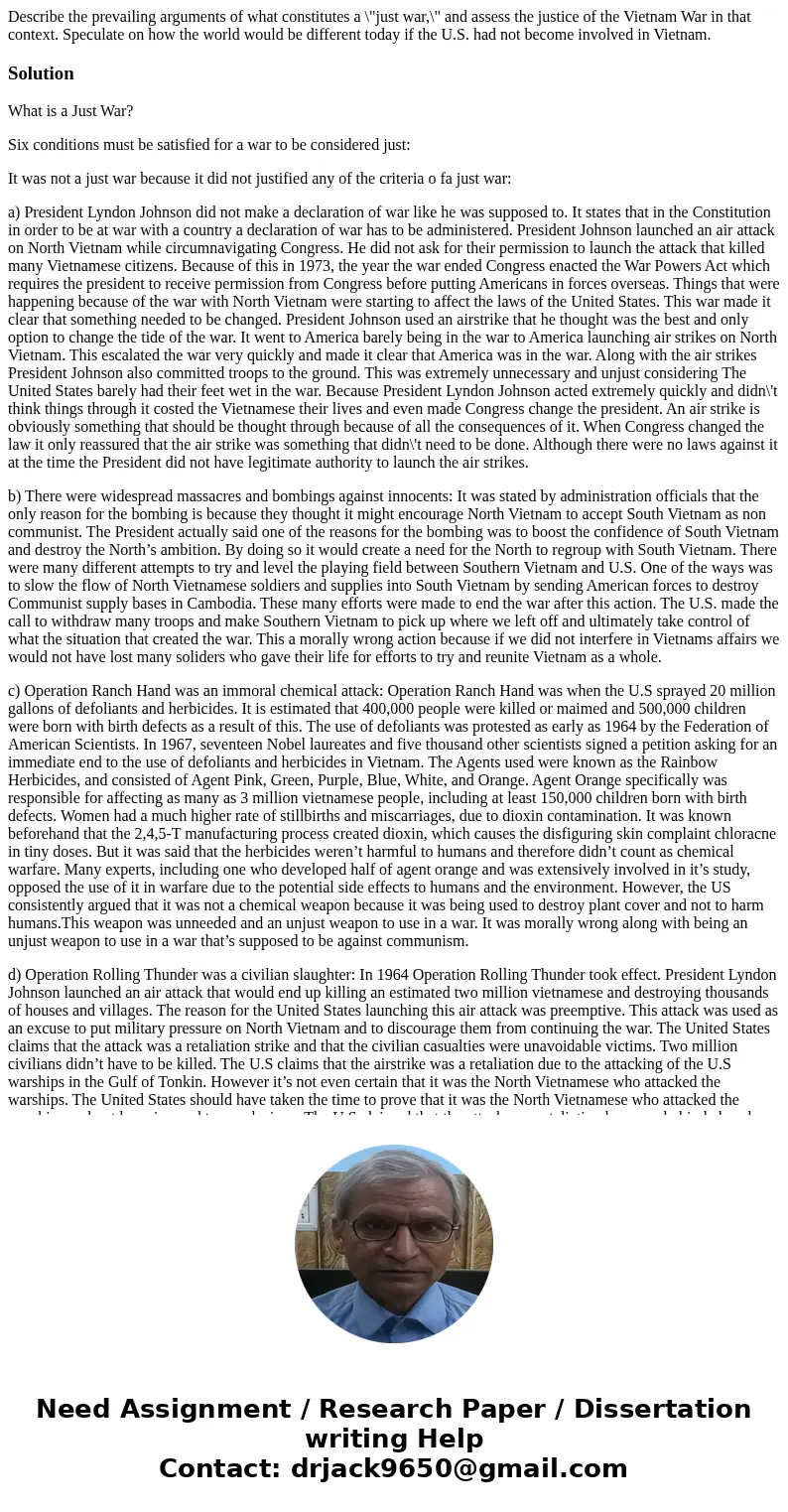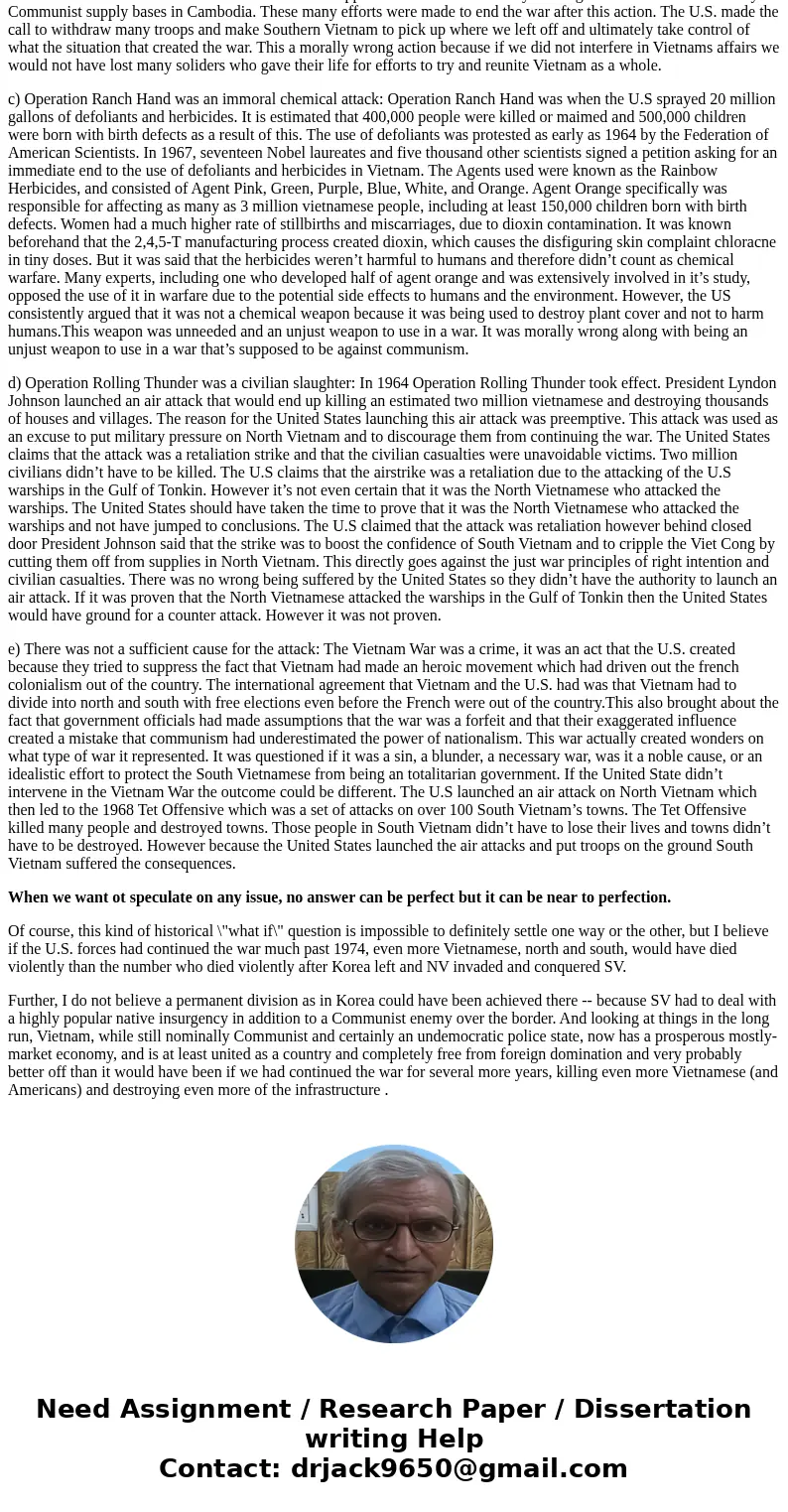Describe the prevailing arguments of what constitutes a just
Describe the prevailing arguments of what constitutes a \"just war,\" and assess the justice of the Vietnam War in that context. Speculate on how the world would be different today if the U.S. had not become involved in Vietnam.
Solution
What is a Just War?
Six conditions must be satisfied for a war to be considered just:
It was not a just war because it did not justified any of the criteria o fa just war:
a) President Lyndon Johnson did not make a declaration of war like he was supposed to. It states that in the Constitution in order to be at war with a country a declaration of war has to be administered. President Johnson launched an air attack on North Vietnam while circumnavigating Congress. He did not ask for their permission to launch the attack that killed many Vietnamese citizens. Because of this in 1973, the year the war ended Congress enacted the War Powers Act which requires the president to receive permission from Congress before putting Americans in forces overseas. Things that were happening because of the war with North Vietnam were starting to affect the laws of the United States. This war made it clear that something needed to be changed. President Johnson used an airstrike that he thought was the best and only option to change the tide of the war. It went to America barely being in the war to America launching air strikes on North Vietnam. This escalated the war very quickly and made it clear that America was in the war. Along with the air strikes President Johnson also committed troops to the ground. This was extremely unnecessary and unjust considering The United States barely had their feet wet in the war. Because President Lyndon Johnson acted extremely quickly and didn\'t think things through it costed the Vietnamese their lives and even made Congress change the president. An air strike is obviously something that should be thought through because of all the consequences of it. When Congress changed the law it only reassured that the air strike was something that didn\'t need to be done. Although there were no laws against it at the time the President did not have legitimate authority to launch the air strikes.
b) There were widespread massacres and bombings against innocents: It was stated by administration officials that the only reason for the bombing is because they thought it might encourage North Vietnam to accept South Vietnam as non communist. The President actually said one of the reasons for the bombing was to boost the confidence of South Vietnam and destroy the North’s ambition. By doing so it would create a need for the North to regroup with South Vietnam. There were many different attempts to try and level the playing field between Southern Vietnam and U.S. One of the ways was to slow the flow of North Vietnamese soldiers and supplies into South Vietnam by sending American forces to destroy Communist supply bases in Cambodia. These many efforts were made to end the war after this action. The U.S. made the call to withdraw many troops and make Southern Vietnam to pick up where we left off and ultimately take control of what the situation that created the war. This a morally wrong action because if we did not interfere in Vietnams affairs we would not have lost many soliders who gave their life for efforts to try and reunite Vietnam as a whole.
c) Operation Ranch Hand was an immoral chemical attack: Operation Ranch Hand was when the U.S sprayed 20 million gallons of defoliants and herbicides. It is estimated that 400,000 people were killed or maimed and 500,000 children were born with birth defects as a result of this. The use of defoliants was protested as early as 1964 by the Federation of American Scientists. In 1967, seventeen Nobel laureates and five thousand other scientists signed a petition asking for an immediate end to the use of defoliants and herbicides in Vietnam. The Agents used were known as the Rainbow Herbicides, and consisted of Agent Pink, Green, Purple, Blue, White, and Orange. Agent Orange specifically was responsible for affecting as many as 3 million vietnamese people, including at least 150,000 children born with birth defects. Women had a much higher rate of stillbirths and miscarriages, due to dioxin contamination. It was known beforehand that the 2,4,5-T manufacturing process created dioxin, which causes the disfiguring skin complaint chloracne in tiny doses. But it was said that the herbicides weren’t harmful to humans and therefore didn’t count as chemical warfare. Many experts, including one who developed half of agent orange and was extensively involved in it’s study, opposed the use of it in warfare due to the potential side effects to humans and the environment. However, the US consistently argued that it was not a chemical weapon because it was being used to destroy plant cover and not to harm humans.This weapon was unneeded and an unjust weapon to use in a war. It was morally wrong along with being an unjust weapon to use in a war that’s supposed to be against communism.
d) Operation Rolling Thunder was a civilian slaughter: In 1964 Operation Rolling Thunder took effect. President Lyndon Johnson launched an air attack that would end up killing an estimated two million vietnamese and destroying thousands of houses and villages. The reason for the United States launching this air attack was preemptive. This attack was used as an excuse to put military pressure on North Vietnam and to discourage them from continuing the war. The United States claims that the attack was a retaliation strike and that the civilian casualties were unavoidable victims. Two million civilians didn’t have to be killed. The U.S claims that the airstrike was a retaliation due to the attacking of the U.S warships in the Gulf of Tonkin. However it’s not even certain that it was the North Vietnamese who attacked the warships. The United States should have taken the time to prove that it was the North Vietnamese who attacked the warships and not have jumped to conclusions. The U.S claimed that the attack was retaliation however behind closed door President Johnson said that the strike was to boost the confidence of South Vietnam and to cripple the Viet Cong by cutting them off from supplies in North Vietnam. This directly goes against the just war principles of right intention and civilian casualties. There was no wrong being suffered by the United States so they didn’t have the authority to launch an air attack. If it was proven that the North Vietnamese attacked the warships in the Gulf of Tonkin then the United States would have ground for a counter attack. However it was not proven.
e) There was not a sufficient cause for the attack: The Vietnam War was a crime, it was an act that the U.S. created because they tried to suppress the fact that Vietnam had made an heroic movement which had driven out the french colonialism out of the country. The international agreement that Vietnam and the U.S. had was that Vietnam had to divide into north and south with free elections even before the French were out of the country.This also brought about the fact that government officials had made assumptions that the war was a forfeit and that their exaggerated influence created a mistake that communism had underestimated the power of nationalism. This war actually created wonders on what type of war it represented. It was questioned if it was a sin, a blunder, a necessary war, was it a noble cause, or an idealistic effort to protect the South Vietnamese from being an totalitarian government. If the United State didn’t intervene in the Vietnam War the outcome could be different. The U.S launched an air attack on North Vietnam which then led to the 1968 Tet Offensive which was a set of attacks on over 100 South Vietnam’s towns. The Tet Offensive killed many people and destroyed towns. Those people in South Vietnam didn’t have to lose their lives and towns didn’t have to be destroyed. However because the United States launched the air attacks and put troops on the ground South Vietnam suffered the consequences.
When we want ot speculate on any issue, no answer can be perfect but it can be near to perfection.
Of course, this kind of historical \"what if\" question is impossible to definitely settle one way or the other, but I believe if the U.S. forces had continued the war much past 1974, even more Vietnamese, north and south, would have died violently than the number who died violently after Korea left and NV invaded and conquered SV.
Further, I do not believe a permanent division as in Korea could have been achieved there -- because SV had to deal with a highly popular native insurgency in addition to a Communist enemy over the border. And looking at things in the long run, Vietnam, while still nominally Communist and certainly an undemocratic police state, now has a prosperous mostly-market economy, and is at least united as a country and completely free from foreign domination and very probably better off than it would have been if we had continued the war for several more years, killing even more Vietnamese (and Americans) and destroying even more of the infrastructure .


 Homework Sourse
Homework Sourse